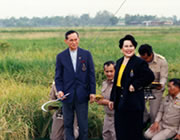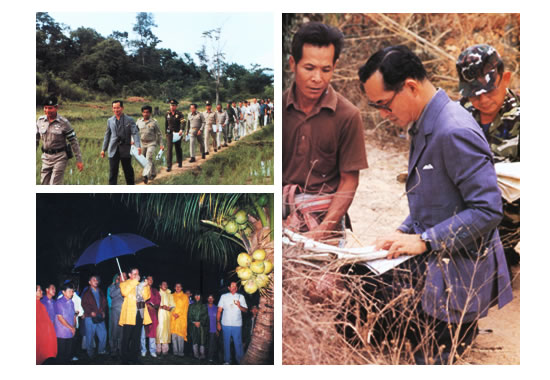“… The prosperity of the country relies on ensuring that the prosperity of agriculture is given top priority…”
The royal address stated above clearly reflects the importance of agriculture for the Thai nation and its people.
Agriculture has been the basic occupation of the Thai people dating back many generations with the approximate two thirds of the nation’s workforce engaged in agriculture. The development of agriculture has always been an important aim of the development of the nation, and is significantly recognized in all of the National Economic and Social Development Plans.
The important royal initiatives regarding the development of agricultural production involve research and experimentation of new plant varieties including economic plants such as mulberry and para rubber, plants for soil improvement and herbal plants; study of insects and pests; as well as development of livestock such as cattle, goat, and sheep, including fish and poultry. The principle is that the promoted knowledge and technology should be simple, inexpensive and applicable for farmers. Significantly, they must be suitable for the social and environmental conditions of the local areas.
Nevertheless, His Majesty’s major concern is to enable the farmers to be self-reliant especially in terms of food such as rice, vegetables and fruits.
|

|
Another important concept is to keep the farmers from having to depend solely on agricultural products because they are vulnerable to fluctuations of market prices and unstable natural conditions. Thus, His Majesty promotes integrated farming among the farmers to reduce risks from having to depend solely on a single crop while enabling them to be self-supporting for all year round. Moreover, the farmers must be able to live on supplementary income such as from household industry like that encouraged by the SUPPORT (Supplementary Occupations and Related Techniques) Foundation under the patronage of Her Majesty Queen Sirikit. The projects promoted by the SUPPORT Foundation urge the farmers to produce handicraft works using readily available materials in the community in order to earn extra income. |
Furthermore, since His Majesty believes that development and rehabilitation of the natural resources has a direct impact on agricultural development, he focuses on their development and conservation to build a foundation for the long-term and sustainable development of the country. He is interested in replenishing and improving the conditions of various resources such as forests, land and water sources in order to allow them to be restored to their natural conditions for the utmost benefits.
From the above objectives, His Majesty’s initiatives are based on the following principles:First: Effective agricultural development requires real research and experimentation as well as gradual practices as elaborated in His Majesty’s speech:
…Agriculture which concerns the livelihood of the Thai farmers should emphasize real practice, rather than relying on textbooks…”
In this connection, it is widely known that His Majesty the King has allocated parts of his Chitralada Villa compound to be stations for conducting research and experiments in all fields of agriculture since 1962.
Regarding research and experimentation, His Majesty the King stresses that they should take place both before and after production. Before production, the points of consideration should include suitability between plants and soil as well as the demand of the markets. After production, they should cover consistency of the markets, the quality of the products and the farmer’s basic knowledge of accounting and agricultural marketing which will enable them to earn a living from self-supporting type of enterprise. His Majesty deems that the collective force of the farmers is crucial in contributing to the success of such enterprise.
However, concerning the increase of effectiveness of production, His Majesty sees the importance in the long-term development of the quality of life of the farmers. He wishes that the Thai farmers can gradually improve their well-being and lead a happy life by not rushing for acquisition of material wealth. The farmers should be concerned more about producing enough food for consumption. This can be obviously seen in the following quotation from his speech:
“…It is not necessary to promote agricultural production only in terms of quantity because this may be a waste of production costs and destroy the soil quality. In fact, we should examine the state of agricultural market including some form of price regulation to prevent the farmers from being affected by their fluctuations…”
Another principle is to make optimal use of nature. For example, deserted land should be used and alternatives to obtain benefits from the natural products should be sought. For example, on one occasion His Majesty the King suggested that sealing wax be produced from rain trees which grow along the highway to the Klai Kangwol Palace. He stated:
“…It derives from the idea of making use of the rain tree to provide employment for the farmers and thereby encourage them to form into groups…”
Making use of nature is also associated with cost-saving. His Majesty stresses the necessity of reducing the expenses of the farmers as much as possible by relying mainly on nature. His techniques range from using cattle rather than machinery to plough the fields and using crop rotation system especially legumes in order to decrease the costs of fertilizers to applying natural fertilizers in place of chemical fertilizers which are expensive and impose long-term effects on the soil quality and conditions. In this relation, His Majesty supports sustainable agriculture. He suggests producing biogas to be used both as fertilizer and fuel. Importantly, he encourages the people to earn extra income from supplementary occupations or non-agricultural activities.
Agricultural projects under His Majesty the King’s initiatives comprise different types of work. In general, these projects concern study, research and experimentation of plant and animal species suitable for the nature of the local areas. Most of the projects are being implemented in the Royal Development Study Centres and the successful results have been disseminated to the public by means of training. These projects also embrace the promotion work such as the Promotion of Rice Cultivation on Terraces Project, Sri Sakhon District, Narathiwat Province; the Integrated Development Project, Phra Nakhon Si Ayutthaya Province; the Royal-initiated Wat Mongkol Chaipattana Area Development Project, Saraburi Province; the Royal-initiated New Theory Demonstration Project at Ban Daen Samakkhee, Khao Wong District, Kalasin Province, etc.
The Royal Development Projects regarding agriculture which are spread throughout the country have significantly upgraded the well-being of the Thai farmers since they aim to solve the major problems in the agricultural sector. In particular, they provide the farmers with greater opportunities to gain access to modern agricultural knowledge and techniques than previously. The farmers are also able to observe and learn from the models of success in various locations which can be applied on their own lands. The development of the farmers and the country’s agricultural sector is not only an end in itself but also a means for the overall development of the country.
